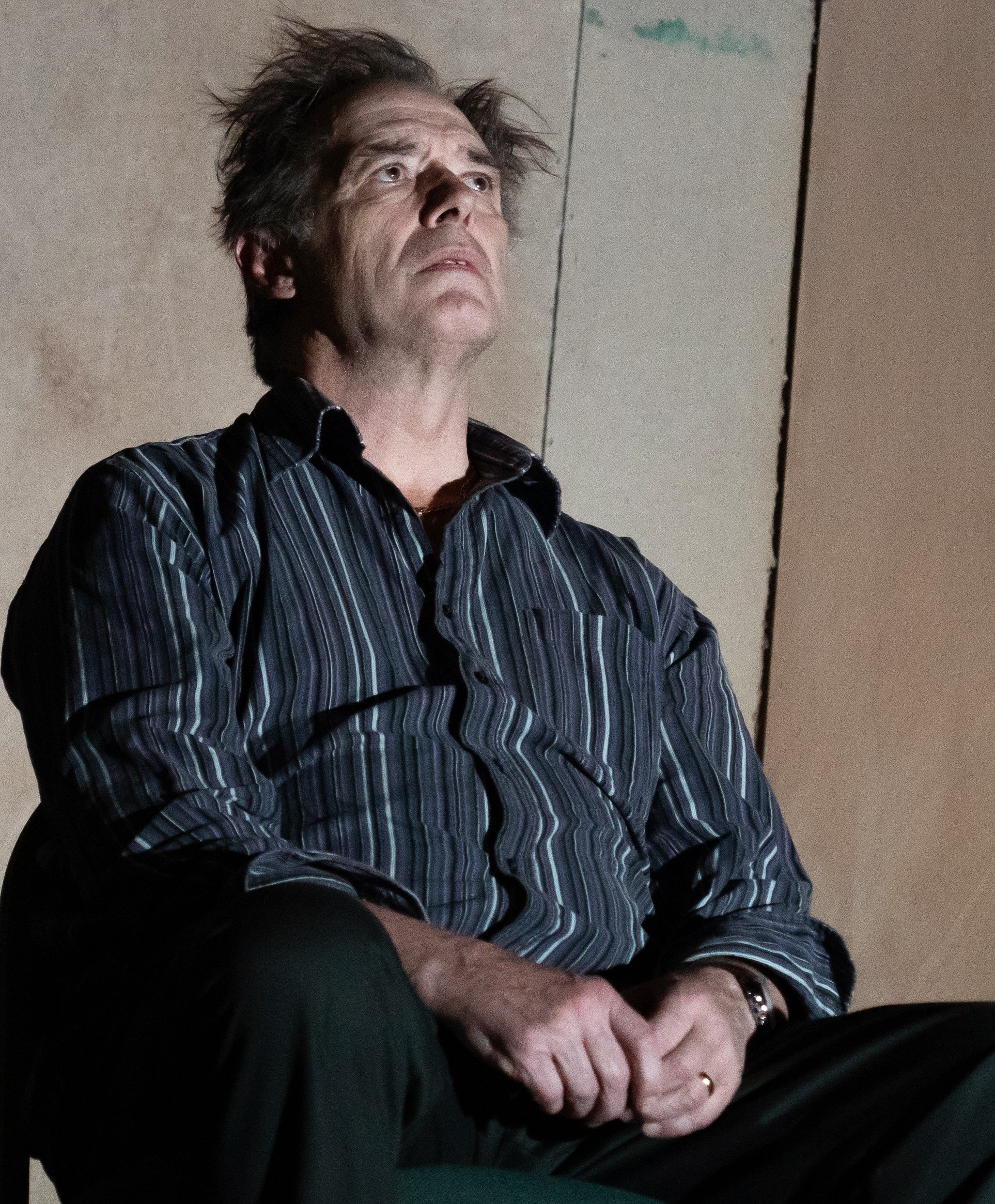Crystal Finn (left) and Heather Raffo play childhood best friends in Corinne Jaber’s Munich Medea: Happy Family, a co-production of PlayCo and WP Theater.
A program note by Corinne Jaber, who is making her playwriting debut with Munich Medea: Happy Family, says that her work is meant to “shine light into places that are difficult to look at” and not “judge nor accuse, but to reveal.” She accomplishes that, but the story line of her fairly static, albeit well-cast, play feels like one we’ve (unfortunately) seen before. At this point, more than 25 years after How I Learned to Drive won the Pulitzer Prize, sexual abuse is no longer a novel subject for the stage.
In Munich Medea: Happy Family, two women come to terms with repressed and distorted memories of their youthful relationships with an older man—the father of one of the women. There is no interaction between characters; they alternate monologues throughout the 75-minute play. Jaber supplies ample plot and character details in her compact script, but telling the story rather than dramatizing it gives the show a stagnant quality and distances the audience emotionally.
Kurt Rhoads portrays a man who, 20 years later, is still rationalizing his inappropriate relationship with a teenage girl.
One of the three characters is the predator himself. Father, as the nameless character is identified in the program, is an actor, with the role of Jason in a production of Medea when he seduces his daughter Caroline’s friend Alice. (The play is set—not especially significantly—in Munich, the playwright’s hometown.)
In portraying Father, Kurt Rhoads puts his silken voice and 20-plus years with the Hudson Valley Shakespeare Festival to superb use. His words and delivery show Father to be a creature of the theater, incapable of separating himself from his work (he recalls Alice’s first visit to his dressing room: “ ‘I’m here and ready,’ she seemed to be saying, determined to enter Jason’s abode”) and casting himself as hero (“Why tell them what is precious and daring? … I was here to protect you, to hold on to our stories, to hold on to this world of ours”) or victim (“All you could do is send lawyers upon me, hunting me down like a stray dog”).
Rhoads plays the part with rich-toned conviction, which doesn’t make this creep sympathetic but does—to invoke every actor’s aspiration—leave it all on stage. Father recites a passage from Medea at one point, but the power of Rhoads’s performance lies in the way it seemingly conflates Father and Jason, who share a self-serving delusion about their marital betrayals.
Alice’s submission to Father feeds his actorly ego: “He likes it that I understand the world of theater, and the life after a show,” she says, “the intensity of a part you carry with you all day until you let it out again at night.” With a classical actor’s command of language, Father romanticizes their relationship (“Oh, my girl, we are not like them. We are made from other stock. … I will wait in front of your window and sing songs until you open it—and even if you don’t, I will sing for you”), and when other adults learn of his conduct, he regards them as an audience reacting to a performance:
Caroline (Finn) remembers her family life when she was growing up—“‘happy’ because of stories untold, things left unsaid.” Photographs by Julieta Cervantes.
You want me to be here on stage in front of you, and rip out my heart and serve it to you, dissected. You want me to open up like a book and make you understand all these complex and contradictory feelings.
But Munich Medea is really about the women and their journeys to self-reconciliation. Heather Raffo and Crystal Finn, too, are finely attuned to their characters, each hinting at a hurt that lingers even though she’s matured out of vulnerability. Caroline (Finn) carries her own secrets about her dad, and she reaches out to Alice (Raffo) after 20 years to unburden herself. Alice had struggled through subsequent relationships with men, until she could finally acknowledge there was never any consent with Father. “That feels good,” she says. “It really does. Makes me happy, elated almost. I can recognize myself, I feel that I belong. No longer alone.”
The two women gain strength by speaking their truth and absolving themselves. Father, on the other hand, is visibly worse for wear (although still working and not in jail) at the end of the play. Caroline, now a mother of four sons, cuts off communication with him but renews her friendship with Alice.
So Munich Medea: Happy Family is, ultimately, a testament to survivors and sisterhood. How much it stirs you may depend on whether you’ve previously seen plays or movies—or read a novel—revolving around these themes and situations. Some may find the subject matter familiar, the monologue format too dry. And some will appreciate it, perhaps even despite that, for its simple but evocative writing and sensitive performances.
Munich Medea: Happy Family runs through Feb. 25 at WP Theater (2162 Broadway). Showtime is 7 p.m. Tuesday through Friday and 8 p.m. Saturday, with Sunday matinees at 3 p.m.; wptheater.org.
Playwright: Corinne Jaber
Director: Lee Sunday Evans
Sets: Kristen Robinson
Costumes: Dina El-Aziz
Lighting: Jeanette Oi-Suk Yew
Sound: Daniela Hart/UptownWorks
Raffo as Alice, a sexual abuse survivor. Photos by Julieta Cervantes






